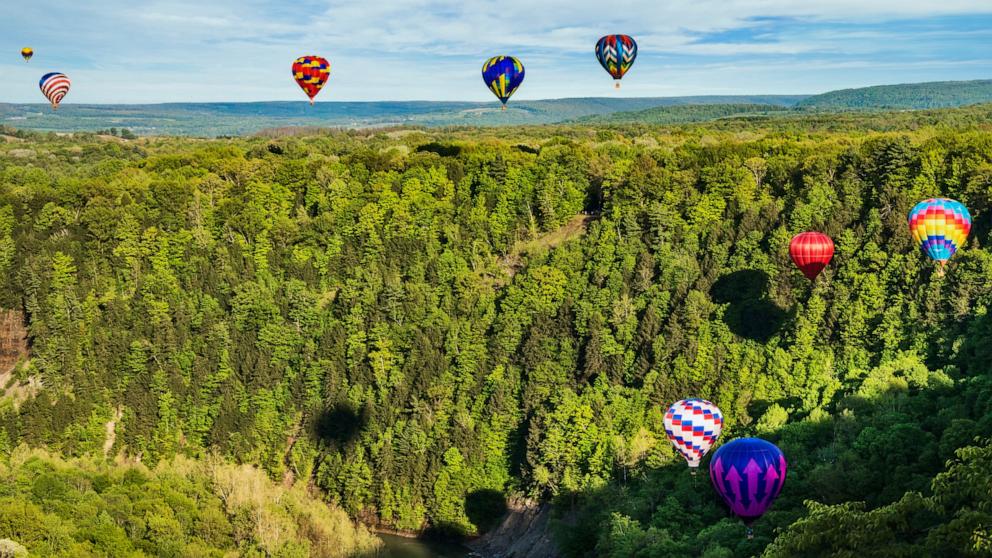WATCH: Some vacation spots are overcrowded and overpriced. Try these destinations instead
When planning your ultimate summer travel destination, you’re likely to consider some of the usual hotspots: the Grand Canyon for hiking, Las Vegas for entertainment and nightlife, Miami for the beach. But National Geographic travel writer Andrew Nelson says that both overcrowding and extreme prices are diluting the appeal of reliable hotspots. He argues that adventuresome travelers should explore alternate destinations that are less known but are just as rewarding.
His new National Geographic book, “Here Not There: 100 Unexpected Travel Destinations,” documents spots across the world that serve as worthy substitutes for every kind of traveler fatigued by “over-tourism” that is causing cities like Nashville, Venice, New York and Amsterdam to swell with large and often unruly hordes of tourists during the peak travel season.
“We can love places to death,” he told ABC News. “I’m not suggesting not to visit the iconic destinations, but as [actor Humphrey] Bogart said, ‘We’ll always have Paris’. There are places that are similar but aren’t as crowded.”
Bucket list on a budget: Travel New Orleans without breaking the bank
Nelson visited more than half of the “destination dupes” in his book. For people planning to travel within the U.S., here are recommendations designed for five different kinds of travelers.
For Southern charm: Natchez, Mississippi, not Savannah, Georgia
This gothic town on the lower Mississippi River offers an extensive collection of majestic homes on the National Register of Historic Places, succulent food at several restaurants, and, of course, fine spirits come happy hour. But beyond that, Natchez has renewed its commitment to tell the story of slavery through tours and educational sites. By doing so, the city is “both real and opulent at the same time,” Nelson says.
Tips to travel Iceland on a budget, plus travel expert-approved gear
For music tourism: Tulsa, Oklahoma, not Nashville, Tennessee
Downtown Tulsa is pulsing with music history due to two museums dedicated to America’s greatest songwriters: the Woody Guthrie Center, which honors the Depression-era folk singer, and the Bob Dylan Center, which opened in 2022 and contains his archive. The Church Studio, once operated by legendary Oklahoma musician Leon Russell, and Cain’s Ballroom, a birthplace of western swing, are also still operating. Tourists can also visit Gathering Place, a 100-acre natural playland that opened in 2018 and includes walking paths, areas for children and outdoor concert lawns — “a blueprint for what a 21st century public space could be,” Nelson says.
For urban cyclists: Indianapolis, Indiana, not Amsterdam
Group bicycle rides along downtown canals are possible in the heart of the Midwest due to the Indianapolis Cultural Trail, an 8-mile-long, two-lane trail that corresponds with waterways and passes through cultural landmarks such as the largest children’s museum in the world; the Bottleworks District, anchored by a 1931 former Coca-Cola bottling plant, now a boutique hotel; and the Madam Walker Legacy Center, which celebrates the first self-made female millionaire in the U.S.
“It’s an example of an American city that has embraced biking,” says Nelson. “It will give you the feeling of Amsterdam for a weekend.”
For theater: Cleveland, Ohio, not New York City
The sprawling Playhouse Square theater district in Cleveland is the largest performing arts district in the U.S. outside of Broadway, says Nelson, and features much more affordability for families on a budget. Ten theaters are in operation, and they feature current touring Broadway fare from musicals to classics to comedy.
“You can fly into the city for a price of a Broadway ticket and enjoy” at least four shows in a single weekend, Nelson says.
Airfare costs expected to rise, expert shares what travelers need to know to save
Architecture tours of the venues, the majority of which are a century old, take place on Saturdays.
For nature: Letchworth State Park in western New York, not the Grand Canyon
Known as the “Grand Canyon of the East” for dramatic cliffs as high as 550 feet, this park offers stunning views across a green 17-mile-long canyon. Located two hours from Buffalo, New York, the park was donated to the state by William Pryor Letchworth, who made his millions manufacturing buggy whips. Today hikers can hike and camp across more than 14,000 acres of wilderness and return in the fall when the colors are on full display. The 24-mile Finger Lakes Trail sends hikers the continuous length of the park, while others run along the park’s three main waterfalls.

